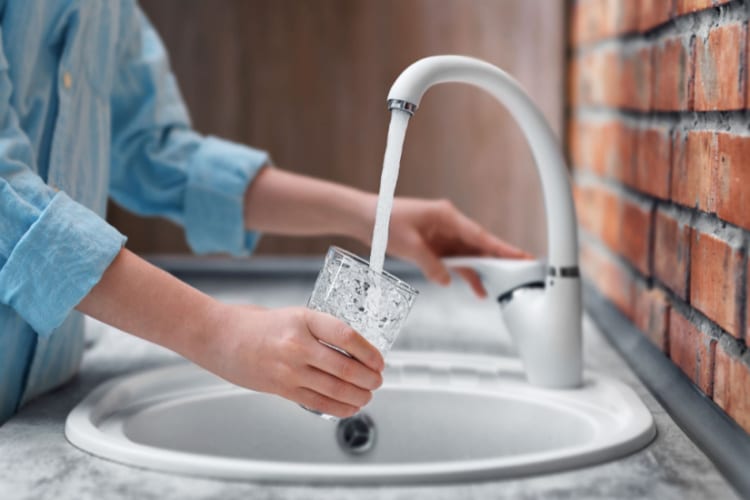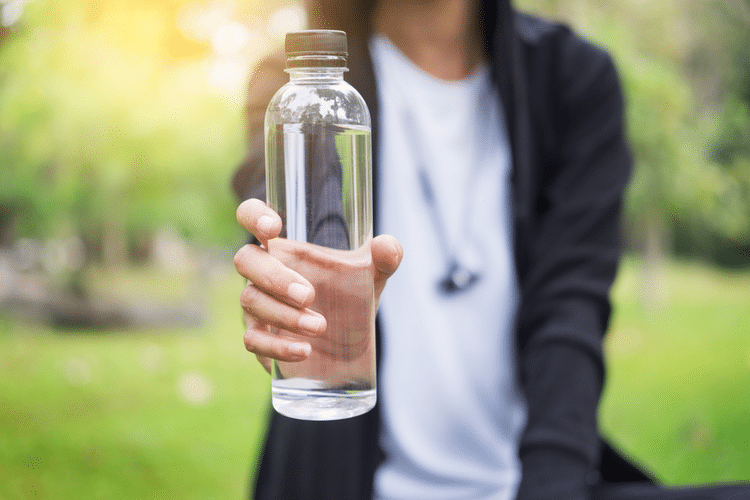Switzerland has some of the cleanest, purest water in the world. Many cities and communities are still able to get their water from clear mountain springs and other natural sources that are pure enough to drink straight from the source.
In this article, we’ll discuss:
- Source of Switzerland’s tap water
- How tap water is treated in Switzerland
- Top cities with the cleanest tap water in Switzerland
Is Switzerland Tap Water Safe To Drink?
Yes, Swiss tap water is safe to drink. In fact, in most areas, the local tap water is safe enough to not need any type of treatment at all.

The water quality has improved tremendously over the last 30 years. In 1980, the country began large-scale wastewater treatment. Laundry detergents haven’t contained phosphates since 1985, and agriculture has become more “green” since 1990.
If tap water sources in a particular area are at risk for contamination from agricultural runoff or trace substances, officials provide treatment to ensure water safety.
The biggest tap water contamination risk is from pesticide runoff. At least one in five drinking water sources are now affected by increased pesticide levels. Pesticides are most prevalent in drinking water in intensively-farmed areas with high precipitation rates.
Nitrates from fertilizers are another agricultural risk to tap water. Currently, 15% of Swiss water bodies exceed the prescribed maximum allowance of 25 milligrams of nitrates per liter of water.
Officials constantly monitor Swiss tap water for agricultural runoff and trace substances such as metals, pharmaceuticals, microplastics, and pathogens. The permitted level of pollutants always remains below a level that would be a health risk.
Is the Water Hard or Soft?
The hardness or softness of the tap water in Switzerland depends on which region you’re getting your tap water. Water’s hardness or softness depends on how much calcium and magnesium are dissolved in the water.
You’re more likely to find hard water in areas of Switzerland where drinking water comes from springs and groundwater that move through limestone, chalk, or gypsum.
Here’s the water hardness and softness rating for Switzerland’s five most populous cities:
- Zurich: medium
- Geneva: soft
- Basel: medium
- Lausanne: soft
- Bern: hard
Top 3 Switzerland Cities With the Cleanest Water
Narrowing down the cities with the cleanest water in Switzerland is not easy since water throughout the country is exceptionally clean. However, Winterthur, Bern, and Lucerne all have exceptional water.
Winterthur
Winterthur, the largest city in Switzerland, exclusively uses untreated groundwater as its main water source. Yet, it continues to have perfect, unpolluted water quality. However, the water is hard, so water softeners are becoming more popular.
Winterthur’s water monitoring system is digital and largely automated, which allows continual assurance of quality water for its citizens.
Bern
Bern is known for having some of the purest drinking water in the world. It is also known as the City of Fountains. It has over 100 public fountains that are medieval works of art fed from underground streams and wells.
Bern’s wastewater treatment plant is one of the most technologically advanced ones in Europe, ensuring wastewater doesn’t contaminate the water supply.
Lucerne
Like Bern, Lucerne boasts 200 public fountains that have been supplying the city with spring water since the middle ages.
About 50% of Lucern’s water comes from Lake Lucerne and is clean enough to not need treatment. However, it still undergoes a biological filtering process to ensure purity.
Another near-half of their water comes from the spring water works at Sonnenberg in Kriens, which requires no additional filtration before entering Lucerne homes. All other water comes from groundwater and undergoes UV disinfection before traveling to homes.
Energy Water Lucerne (EWL) contracts with the city to ensure that the water that reaches Lucerne homes is of the best quality.
Who Regulates Water in Switzerland?
While the Swiss government creates the legal framework for water conservation, protection, and quality standards, specific water policies and laws are up to cantons and local authorities in each community. This approach means that water governance falls based on political boundaries rather than water basin boundaries, often causing conflict between areas that share water sources like rivers or lakes.
The Federal Department of Home Affairs (EDI) has outlined regulations for water treatment and quality throughout the country. Switzerland’s federal Agricultural Policy 2022 (AP22) further outlines measures to counteract water pollution.
The Federal Food Safety and Veterinary Office (BLV) and Federal Office for the Environment (FOEN) check Switzerland’s water quality based on the World Health Organization’s (WHO’s) Protocol on Water and Health. These protocols ensure water safety evaluations every three years.
Where Switzerland Gets Its Water From
Switzerland’s water comes from springs, groundwater, and local bodies of water.
Springs
Switzerland gets 40% of all its drinking water from springs. Much of this comes from the Alps and the Jura.
As the water flows through gravel and stone and seeps through different layers of the soil and subsoil, it goes through a natural purification process and picks up minerals like magnesium and calcium carbonate.
Groundwater
Switzerland gets another 40% of drinking water (50 billion cubic meters) from groundwater reserves. Most groundwater comes from the Central Plateau. As the groundwater seeps through various soil layers, it acquires various minerals.
Bodies of Water
The remaining 20% of Swiss water comes from rivers, lakes, and streams. Water from bodies of water is softer and requires more processing because they and their watersheds are often exposed to man-made contaminants.
How Tap Water Is Treated in Switzerland
The majority of the tap water in Switzerland is pure enough to leave untreated or simply treat with UV light. Here’s a breakdown of the treatment types currently in use:
- Untreated: 41%
- Only UV disinfection: 22%
- Multi-stage treatment without UV: 20%
- Other one-step treatments: 9%
- A combination of UV and other treatments: 8%
Research and developments from Eawag have contributed greatly to water quality. Some developments in use today include membrane bioreactors, biofilm reactors, and fluidized bed processes.
Is Drinking Bottled Water the Safest Option in Switzerland?
Drinking bottled water may not be the safest option in Switzerland. While bottled water is available in Switzerland, most people consider tap water to be a superior choice since it’s already some of the cleanest water in the world.

Nevertheless, 30% of Swiss consumers prefer drinking bottled water. The chief executive of Switzerland’s leading bottled water company believes that those who prefer bottled water do so because they want unadulterated water that utility companies haven’t filtered, sterilized, or added fluoride or chlorine. Others may worry about hormones or nanoparticles in city water.
However, a study of globally-sourced bottled water showed that 93% had more microplastic contamination than tap water. Some of these microplastics were a result of the bottled water packaging process. Current studies show that microplastics may be the cause of various human health problems.
From time to time, authorities may issue a warning that water supplies may have been contaminated. In those cases, drinking bottled water is the safer option.
Are Water Filters Necessary in Switzerland?
If you’re drinking water from the tap in Switzerland, there’s no need for a water filter to remove contaminants.
All the strict regulations regarding water quality have led to developments that make water coming from many sources clean enough to need no filtration or only minimal filtration before coming into people’s homes as drinking water. However, some citizens still use water filters for peace of mind.
If you’re in a Swiss city that adds chlorine to its water, like Zurich, you may want to use a water filter to remove the taste of chlorine.
However, people who live in areas with hard water often use a water softener to make the water taste better, be more gentle for hair and skin, and be less likely to leave residue on dishes.
If you’re hiking in Switzerland, you’ll still want to use a water filter for stream water because there’s always the chance for waterborne pathogens. In fact, you may even see signs warning “Kein Trinkwasser” along your route to warn you not to drink the water.
Conclusion
The tap water in Switzerland is safe and highly drinkable. The water in most cities is exceptionally pure because it comes from springs and groundwater.
However, even other water sources in Switzerland require very little treatment because of improvements in water regulations since the 1980s.
For the most part, there’s no need to use extra water filters in homes except for personal reasons. However, some people use water softeners in areas where the water is harder.
While in Switzerland, there’s no need to depend on bottled water because the water is usually perfect right out of the tap or even from public outdoor fountains in some cities.